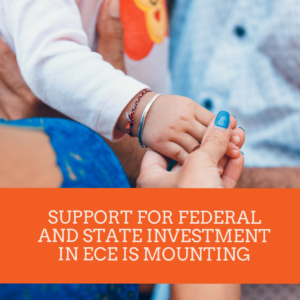By Paula Drew, WEESSN Dane County Project Manager, WECA
 Faced with a pandemic that has shut down the economy, belief that early care and education (ECE) is essential and not expendable is solidifying across the county. This blog post reviews two recent national surveys that examine experiences with and support for ECE during the COVID19 pandemic.
Faced with a pandemic that has shut down the economy, belief that early care and education (ECE) is essential and not expendable is solidifying across the county. This blog post reviews two recent national surveys that examine experiences with and support for ECE during the COVID19 pandemic.
A national survey of 800 parents by the Bipartisan Policy Center and Morning Consult shows that parents who typically rely on ECE so they can work, are struggling amid mass closures. Parents who can work from home report working less, working late into the night, and are experiencing a reduction in wages because of this. For parents doing essential work outside the home, only 22% could use their previous care arrangements during the pandemic. 47% of parents are already concerned that they won’t be able to afford child care once the crisis is over. Moreover, the majority of parents surveyed said they believed the state and federal government are financially responsible for keeping ECE financially stable during this crisis.
Additionally, Child Care Aware and Save the Children Action Network worked with GQR to interview 1,200 registered voters (parents and non-parents) across the nation about their support for federal relief dedicated to ECE. 87% of votes (across partisan, racial, generational, and economic lines) are supportive of funding to ensure ECE programs can cover payroll and other expenses during massive shutdowns. 78% of voters said that ECE staff providing care for essential workers should receive increased pay for doing so. These statements of support polled very high among all voters and is recommended in all advocacy efforts:
Child care is essential for many American families to return to work. Family budgets are already being strained as many have been without work or had a decrease in income because of the virus. We need to ensure that all child care providers can open as soon as it is safe to do so – so that families can get back to work as soon as they are able.
Child care should be viewed as a core infrastructure in the United States and should be funded. Without child care, much of the workforce could not work and the economy would suffer.
Hundreds of thousands of children could go without access to safe and quality care if programs close because the federal government fails to act.
It is crystal clear that the resilience, strength, and tenacity of this workforce is essential to strengthening recovery efforts. Many providers would say they are not doing anything special, just doing their part to help. In the eyes of all of us admirers, they are rising in the face of incredible challenge to provide a solid backbone for this county’s recovery efforts.

